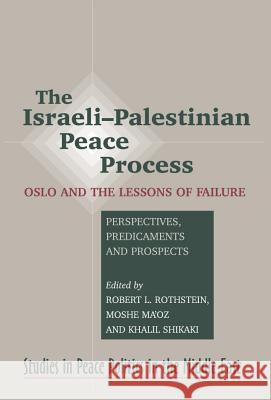The Israeli-Palestinian Peace Process: Oslo and the Lessons of Failure: Perspectives, Predicaments, Prospects » książka
The Israeli-Palestinian Peace Process: Oslo and the Lessons of Failure: Perspectives, Predicaments, Prospects
ISBN-13: 9781845190583 / Angielski / Miękka / 2004 / 174 str.
The Israeli-Palestinian Peace Process: Oslo and the Lessons of Failure: Perspectives, Predicaments, Prospects
ISBN-13: 9781845190583 / Angielski / Miękka / 2004 / 174 str.
(netto: 159,58 VAT: 5%)
Najniższa cena z 30 dni: 143,51
ok. 30 dni roboczych.
Darmowa dostawa!
This book, the third in the series Studies in Peace Politics in the Middle East, is an expert assessment on what went wrong with the Oslo peace process - a process that began in euphoria and degenerated into disaster. The contributors provide a wide-ranging, albeit very different, retrospective of the pursuit of Israeli-Palestinian peace, and analysis of how negotiations should best proceed from here on. Contributors include: Mustafa Abu Sway, Professor and Director of the Islamic Research Center, Al Quds University, an eminent authority on the Islamic position on the Arab-Israeli conflict; Yossi Ben-Aharon, an Israeli ambassador and former Deputy Director General of the Foreign Ministry; Abraham Diskin, former Chairman of the Political Science Department at the Hebrew University of Jerusalem, and advisor to several Israeli prime ministers, the Ministry of Foreign Affairs, and the Knesset; Manuel Hassassian, Professor of International Relations and Executive Vice-President of Bethlehem University; Aaron D. Miller, Deputy Special Middle East Coordinator for Arab-Israeli Negotiations at the State Department; Ron Pundak, who played a decisive role in the secret track of unofficial negotiations that culminated in the Oslo Accords, and advised on the blueprint for Final Status Negotiations; Robert L. Rothstein, Harvey Picker Professor of International Relations at Colgate University; Moshe Ma'oz, Professor of Middle Eastern Studies and Senior Research Associate of the Truman Institute, The Hebrew University of Jerusalem; Ziad Abu Zayyad, Minister of Jerusalem Affairs of the Palestinian National Authority; and Khalil Shikaki, Associate Professor of Political Science and Director of the Palestine Center for Policy and Survey Research in Ramallah. Although the terrorist strategy has greatly increased the psychic insecurity of daily living and the virtual disinitegration of the peace proces that had nearly brought the Palestinians a relatively good settlement at the end of the Clinton admintstration, breaking out of the cycle of violence and retaliation requires knowdge not only of why Oslo failed, but also some preliminary judgments about the complex interactions between Al-Qaeda's terrorist assaults and the windows of opporutnity that may open in the Middle East. Understanding the Oslo process under present cirucmstances is crucial.











